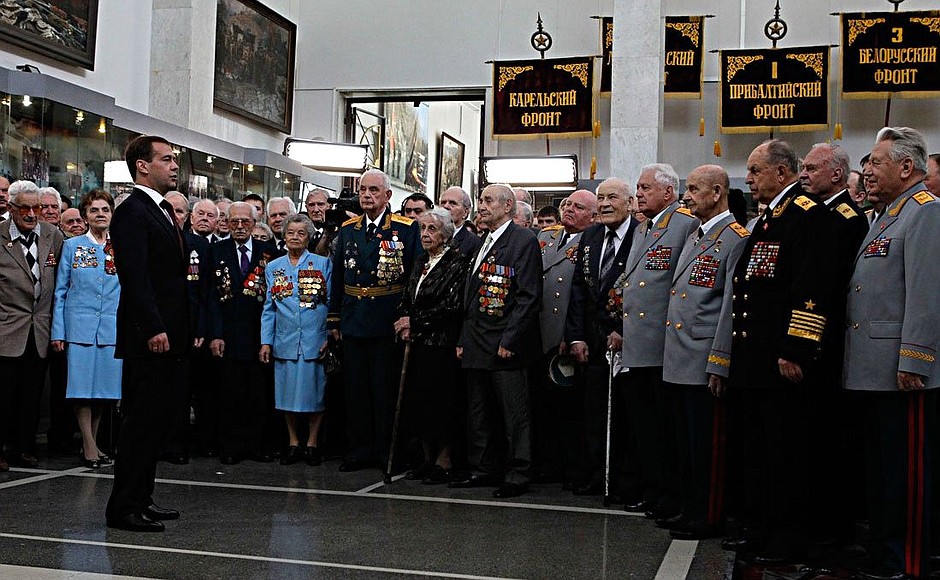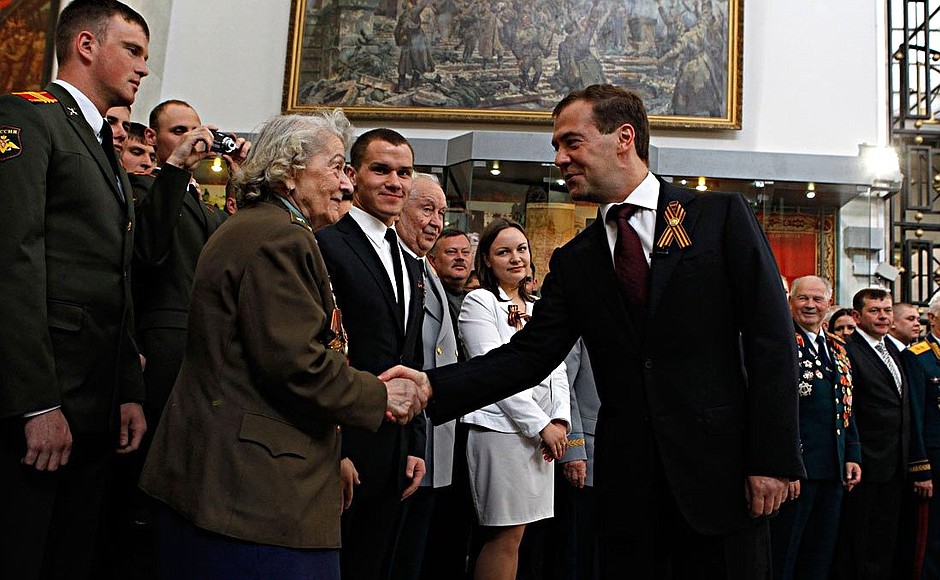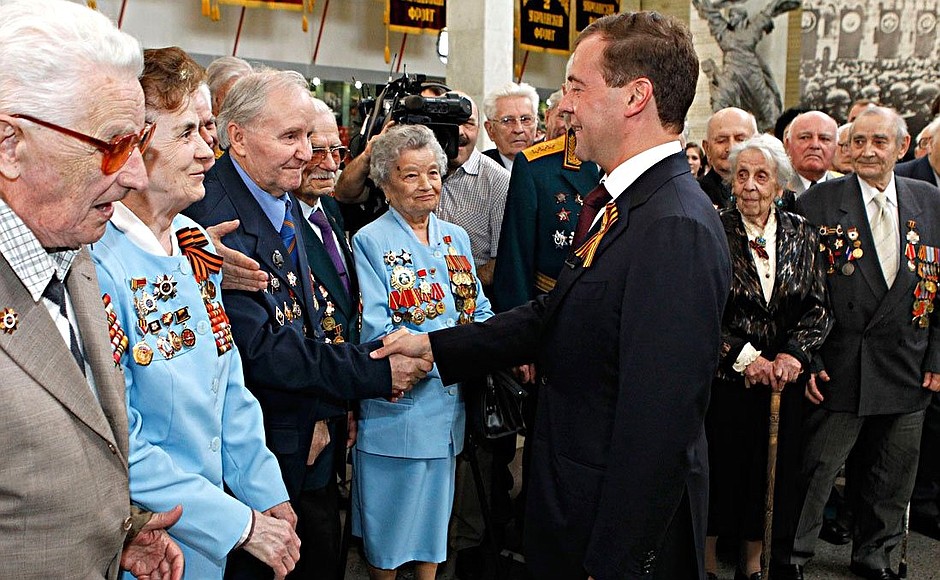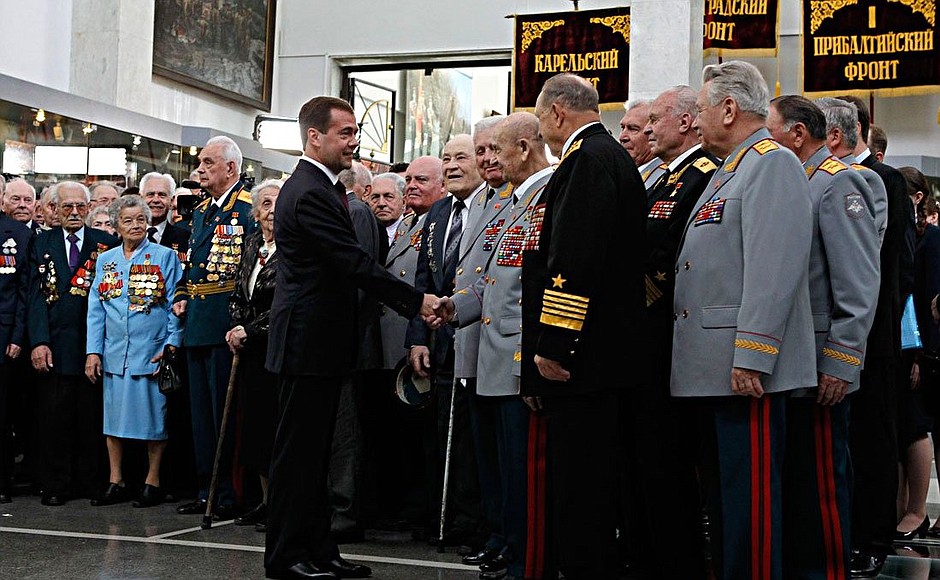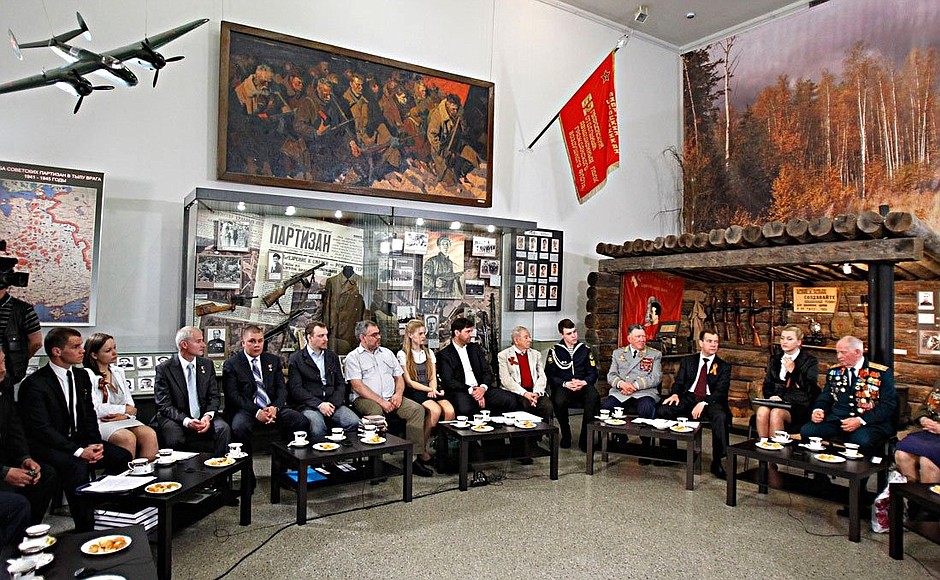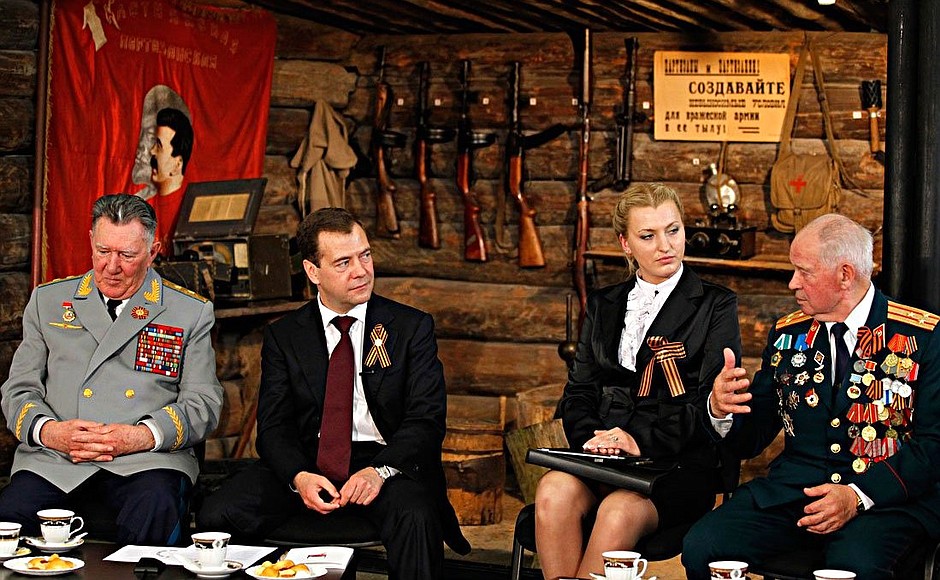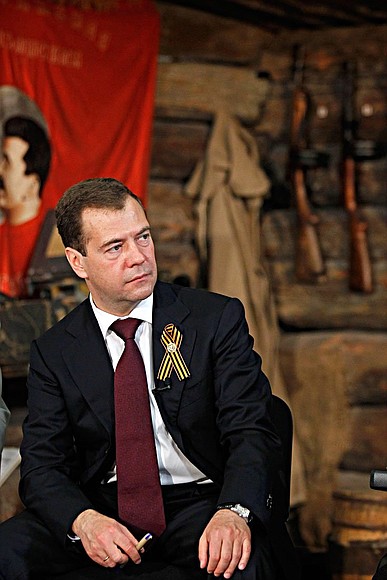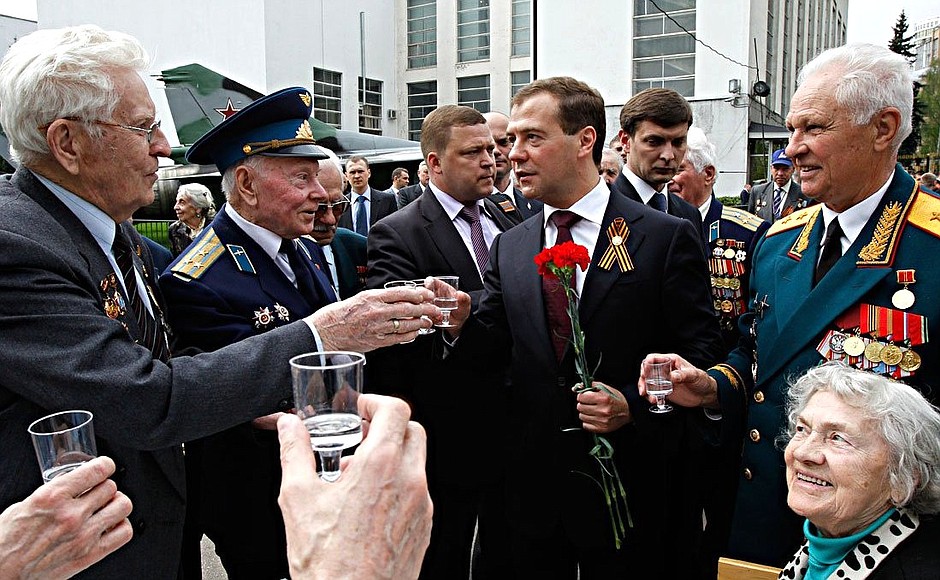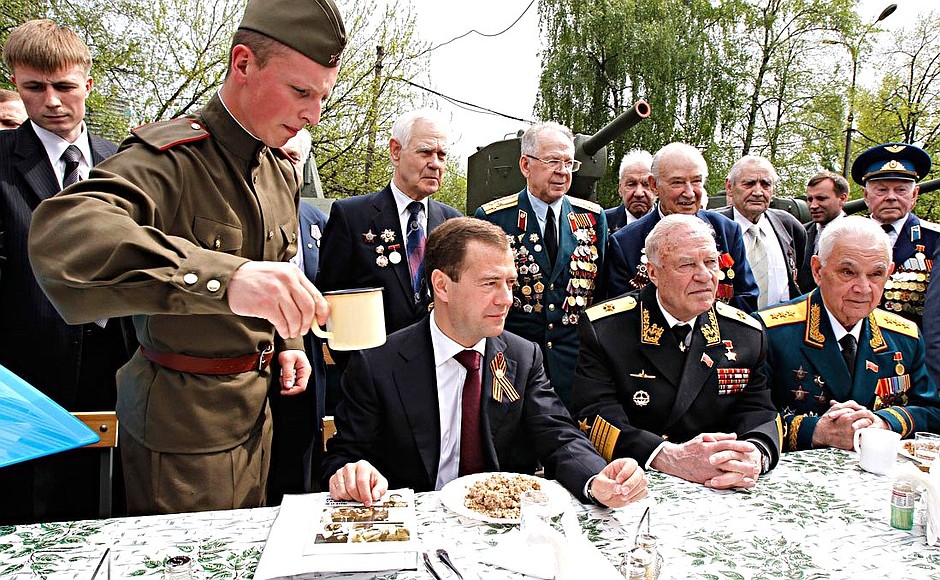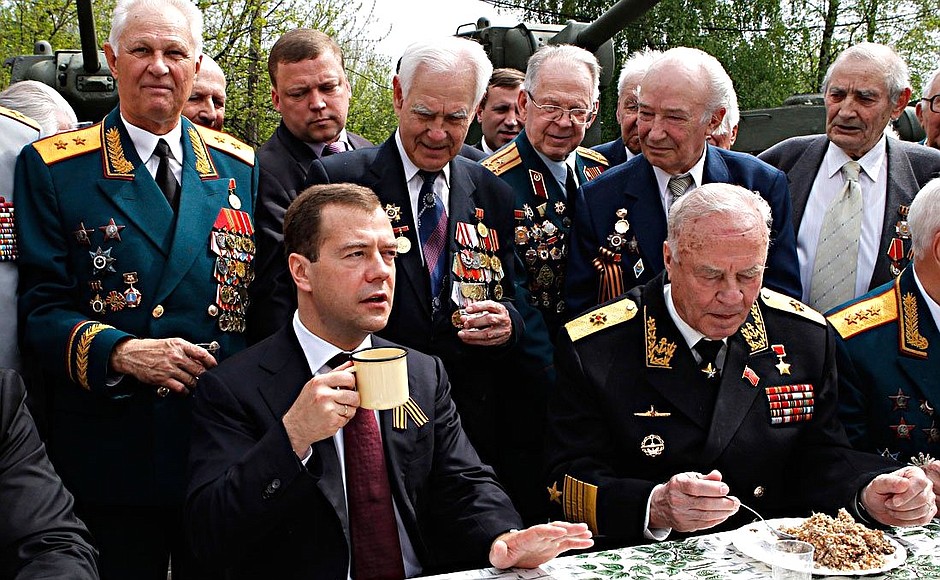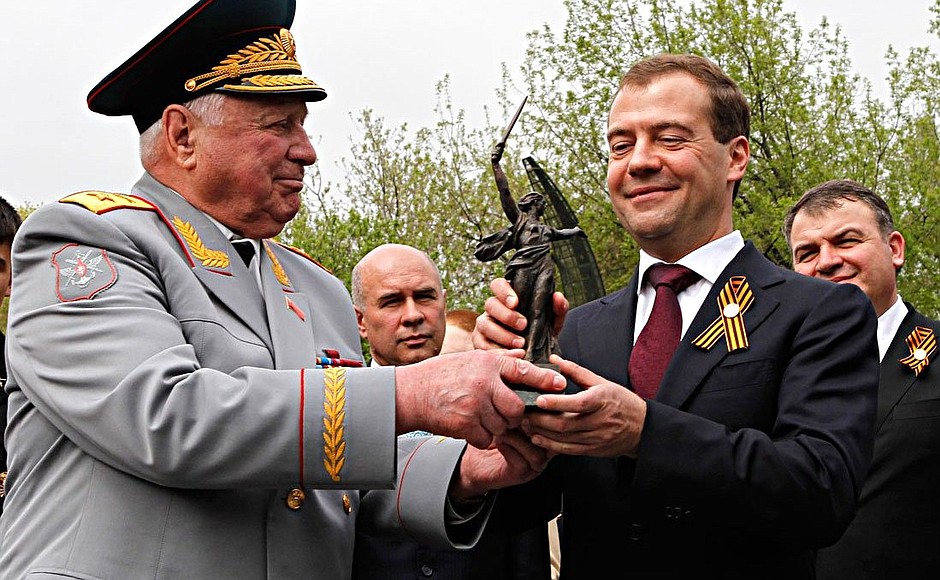The veterans shared their memories with the President and spoke about their problems. Mr Medvedev discussed with them how to address the problems with military-patriotic education for young people, and suggested, in particular, the need to publish new books, reprint old works, produce new films, and set up new museum exhibits.
One such example, the President said, is the newly opened exhibition devoted to the Banner of Victory at the Russian Central Armed Forces Museum.
Timed to coincide with Victory Day, the museum put the original Banner of Victory raised atop the Reichstag in 1945 on display. Mr Medvedev spoke at the opening ceremony at the museum’s Banner of Victory Exhibition. The main guests at the event were Great Patriotic War veterans who served alongside Mikhail Yegorov and Meliton Kantaria, the two soldiers who raised the banner on the Reichstag.
After the official ceremony, the veterans invited the President to join them at a field kitchen set up in the museum’s inner courtyard.
* * *
President of Russia Dmitry Medvedev: Veterans and friends,
Let me congratulate you once again on the upcoming Victory Day holiday.
It is very interesting to be here at the Central Armed Forces Museum. I remember when I was in school (in Leningrad), and we visited all manner of exhibitions at museums of this kind (we have many such museums around the country, though this is the biggest one). We’d spend hours going from one exhibit to another. It was always exceptionally interesting and played a huge part in educating several generations of our people.
Victory Day is always the occasion to remember the heroes of the Great Patriotic War, and to talk about what we need to do to preserve our Armed Forces’ power and strength and ensure peaceful skies above our heads. At the same time, it is also a chance to talk about our history. Our country’s history was very complicated in the twentieth century, but offers us examples of genuine heroism and love for the fatherland.
Here at the museum today are not only veterans who fought in the Great Patriotic War, but also those who fought in other places too, in Afghanistan and in the Caucasus, and also members of the military-patriotic clubs that help us to preserve our history.
”We can have a sense of belonging to a single united nation only is we know, remember, and analyse our history.“
Let me risk spoiling the holiday mood a little by saying that I think we still have a lot to do to educate our people about historical events in the right spirit. Many of our people studied history in school, watched films (we have many good films, Soviet-era films, and some interesting new ones too), but have only a rather formal and even abstract knowledge of the Great Patriotic War and other wars. It is very important that people know how things looked, have the chance to touch this history with their own hands, or take part in military-patriotic games, for example. This is not something to be shy about, all the more so as there are good examples of such events elsewhere in the world. I think this is always something that can make a useful contribution to educating young people.
In any case, I recall that when I was young I always found it interesting to learn about history this way, even if it was not always done in the most ideal manner, because we have had our dose of formalism in one way or another at every time: during the Soviet years, and now too, we still have it aplenty.
But opportunities for organising modern exhibitions, putting new exhibits on display, taking part personally in military-patriotic games, look at and touch the equipment and objects from those years are all important, I think, to help us get a sense of ourselves as all living in one big country, a very complex but at the same time great country. I therefore want to thank the veterans, and also the younger people here involved in military-patriotic work, for their efforts, because what they are doing is truly invaluable in uniting us all.
We can have a sense of belonging to a single united nation only is we know, remember, and analyse our history. Of course, different views exist, and there is no need for us all to share exactly the same assessment. But we are simply obliged to remember these events and pass on our knowledge to our descendants.
I think we had problems in military-patriotic education due to the disorganisation in our country immediately following the Soviet Union’s collapse. Now, however, we are making efforts to redress these shortcomings. We need new books, and we need to reprint good old books too, organise new exhibitions, and digitalise documentary materials on the Great Patriotic War and other wars too. We need new events in this sense.
I think it is very important that we are all here today to open this new exhibition dedicated to the Banner of Victory. Now, anyone can see this banner, and in very monumental form, and at the same time, it will be housed in modern conditions, kept in a special capsule maintaining the right temperature the whole time. This is an example of how we can use new technology and create new opportunities for our people and any visitors to our country to have contact with these monuments of our history.
I want you to tell me about the work you are doing, and about what other steps we can take. I met with veterans, and with members of the military-patriotic organisations last year too and even issued several instructions. Perhaps you will fill me in now about what has and has not been done, and what changes could be made. This is our common duty, after all, and if we do not work on this together, from the state authorities to our ordinary citizens, our country will have no future.
